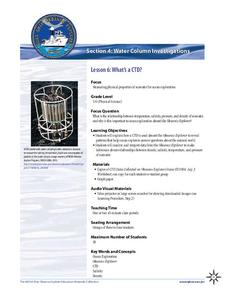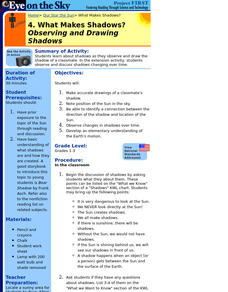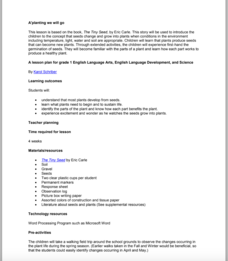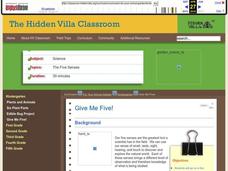University of Waikato
Observing Water's Thin 'Skin'
Keep the tension up in the classroom. The class first observes as the teacher creates a dome of water above a glass by adding paperclips into an already full glass. Classmates then work in pairs to see how many drops of water can fit...
NOAA
What's a CTD?
Why are the properties of the water important when exploring the ocean? Young scientists discover the tools and technology used in deep sea exploration in the fourth installment in a five-part series. Groups work together to examine...
Smithsonian Institution
Science Starts With a Question: Energy - Teacher Guide
Get an up-close look at energy transfer. Using a three-part activity, investigators first observe a teacher-led demonstration before building a model marble track to convert potential energy to kinetic energy. Scientists explore six...
Princeton University
A Teacher's Guide to the Universe
Astronomers only observe four percent of the universe as the rest hides in darkness. The size, shape, and movement of the universe are the focus for an long-term high school unit. Its 43 lessons include hands-on experiments, direct...
Curated OER
What Makes Shadows? Observing and Drawing Shadows
Students make accurate drawings of a classmate's shadow. They note position of the sun in the sky. They identify a connection between the direction of the shadow and the location of the sun. They observe changes in shadows over time.
Curated OER
Making Observations: Candle Activity
In this making observations: candle activity worksheet, students write observations of an unlit candle, then write observations of a lit candle, then sort them as quantitative or qualitative observations.
Curated OER
Summer Activities: The Wonders of Nature!
Students examine the world of nature. In this early childhood lesson plan, students develop observation skills as they bird-watch and make rainbows, experimentation skills as they explore seeds and carrots, prediction skills as they...
Curated OER
Observing the Pumpkin Cycle
Students observe and listen to nonfiction books about the life cycle of pumpkins. They practice early reading skills in a shared reading related to pumpkins. They observe the life cycle of a pumpkin including growth and decay.
Nuffield Foundation
Observing Water Moving Through Plants
We know plants assist in the water cycle, but how do plants get water from the ground into the air? Through a series of demonstrations or labs, scholars observe the movement of water through plants. They microscopically view the cells...
University of Texas
Observing the Moon
Why does it look like there is a man on the moon? Why does the moon look different every night? These are the focus questions of a lesson that prompts class members to observe and record the nightly changes of Earth's natural satellite.
University of Minnesota
Mirroring Emotions
Do you ever give your class the "teacher look"? Without saying a word, they become silent and engaged (hopefully). How do they know what you're thinking? Explore the concept of nonverbal communication and how it relates to our mirror...
Curated OER
Growing A Coral Skeleton
Students research the growth of coral. In this coral polyps lesson, students simulate the growth of coral by using available materials to grow crystals. Students record observations in a scientific journal.
Curated OER
A'planting We will Go
Germination is an amazing process that results in amazing things. The book The Tiny Seed is the inspiration for a set of activities that will help build early literacy, observation, language, and writing skills. The class observes how...
Curated OER
Give Me Five!
Students become familiar with their five senses and how their experiences would change without them. In this observations instructional activity, students observe using their five senses in a garden. Students illustrate what they've...
Curated OER
Viewing Bacteria
Have you ever wanted to know the true structure of E.coli? Does the thought of peering into its "small world" sound exciting? Here is a instructional activity that allows pupils the ability to do just that. Blossoming microbiologists use...
Curated OER
"Snapshot" Exercises & Sensory Detail Word Bank
Read a sample of creative descriptive writing to your science class. Discuss how writing can be used to record and communicate observations that scientists make. Reading selections and thought-provoking questions are suggested. Also...
Curated OER
Erupting Volcanoes!
Learners examine the causes of earthquakes, volcanoes, and floods, and explore how these events shape the surface of the earth. In this erupting volcanoes lesson, students create a volcano model of their own, make observations about how...
Curated OER
Investigate Science Using Crayfish
Young scientists discover the importance of scientific investigation by observing live crayfish. They carefully observe the patterns of crayfish in different environments. Then they discuss their conclusions and define what all living...
Curated OER
CLOUD IN A BOTTLE
Students make observations of what they see happening in the formation of a cloud in a modeled situation. They compile their observations in a list to better explain how the formation happened.
Curated OER
Learning in Cockroaches
Students make scientific observations. For this stimulus response lesson, students make observations and collect data to determine if cockroaches can learn. A secondary purpose of this lesson is to provide students with the opportunity...
Intel
Starquest
Almost every ancient culture observed the stars and saw pictures in the patterns. Studying stars allowed them to guide travelers, determine when to plant crops, when to harvest food, and the stories surrounding the images include some of...
Consortium for Ocean Science Exploration and Engagement (COSEE)
Ocean Acidification: Whats and Hows
Open this lesson by demonstrating the production of acidic carbon dioxide gas by activated yeast. Emerging ecologists then experiment with seashells to discover the effect of ocean acidification on shelled marine organisms. They measure...
Science Friday
Ugh, a Bug!
Young entomologists familiarize themselves with the physical characteristics of insects. Composed of two activities, each lesson involves your scientists tapping into their prior knowledge of bugs and making observations of real live...
Baylor College
Needs of Plants
What better way to learn about plant life than by creating a class garden? Young botanists start with a brief discussion about radishes before planting seeds and watching them grow. To determine the importance of water, sunlight, and...

























